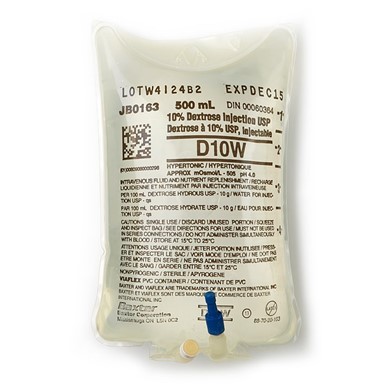A nurse is caring for an infant who has gastroenteritis.
Which of the following assessment findings should the nurse report to the provider?
Sunken fontanels and dry mucous membranes
Temperature 38° C (100.4° F) and pulse rate 124/min.
Decreased appetite and irritability.
Pale and a 24-hr fluid deficit of 30 mL.
The Correct Answer is A

These are signs of severe dehydration in an infant, which can be life-threatening and should be reported to the provider immediately. The infant may need intravenous fluids and electrolytes to restore hydration and prevent complications.
Choice B is wrong because a temperature of 38° C (100.4° F) and pulse rate of 124/min are not abnormal for an infant and do not indicate severe dehydration. These are common findings in an infant who has gastroenteritis, which is an inflammation of the stomach and intestines caused by a virus, bacteria, or parasite.
Choice C is wrong because decreased appetite and irritability are also common findings in an infant who has gastroenteritis, but they do not indicate severe dehydration. The nurse should encourage oral rehydration with fluids such as breast milk, formula, or oral electrolyte solution.
Choice D is wrong because pale skin and a 24-hr fluid deficit of 30 mL are not signs of severe dehydration in an infant.
A fluid deficit of 30 mL is less than 1 oz and is not significant for an infant who weighs about 10 kg (22 lbs). A fluid deficit of more than 10% of body weight would indicate severe dehydration.
Normal ranges for vital signs in infants are as follows:
- Temperature: 36.5° C to 37.5° C (97.7° F to 99.5° F)
- Pulse rate: 100 to 160/min
- Respiratory rate: 30 to 60/min
- Blood pressure: 65/41 to 100/50 mm Hg
Normal ranges for fluid intake and output in infants are as follows:
- Fluid intake: 100 to 150 mL/kg/day
- Fluid output: 1 to 2 mL/kg/hr
Nursing Test Bank
Naxlex Comprehensive Predictor Exams
Related Questions
Correct Answer is B
Explanation
The correct answer is B. Hip arthroplasty 1 week ago.
Alteplase is a drug that dissolves blood clots by converting plasminogen to plasmin. It can be used for acute ischemic stroke, but it has some contraindications that depend on the indication and the type of administration of the drug. Some common contraindications for alteplase are hypersensitivity, active internal bleeding, history of intracranial hemorrhage, bleeding disorders, and high blood pressure. Other contraindications may vary depending on the specific condition and the time window of treatment. Alteplase can cause serious or fatal bleeding as a side effect.
Choice A is wrong because family history of malignant hypertension is not an absolute contraindication for alteplase, although uncontrolled hypertension (>185 mmHg SBP or >110 mmHg DBP) is.
Choice C is wrong because chronic obstructive pulmonary disease is not a contraindication for alteplase, although it may increase the risk of pulmonary hemorrhage.
Choice D is wrong because acute renal failure 6 months ago is not a contraindication for alteplase, although current use of direct thrombin inhibitors or direct factor Xa inhibitors is.
Normal ranges for blood pressure are <120/80 mmHg for normal, 120-129/<80 mmHg for elevated, 130-139/80-89 mmHg for stage 1 hypertension, and ≥140/≥90 mmHg for stage 2 hypertension.
Normal ranges for platelet count are 150,000 to 450,000 platelets per microliter of blood.
Normal ranges for INR are 0.8 to 1.2 for people who are not taking blood thinners and 2 to 3 for people who are taking warfarin.
Normal ranges for aPTT are 25 to 35 seconds for people who are not taking blood thinners and 46 to 70 seconds for people who are taking heparin.
Correct Answer is D
Explanation

This is because abruptly stopping TPN can cause hypoglycemia, which is a low blood sugar level that can cause shakiness, diaphoresis, confusion, and seizures. Therefore, infusing dextrose 10% in water temporarily at the same rate as the TPN can prevent this adverse effect. Dextrose 10% in water is a hypertonic solution that contains 340 calories per liter and can maintain the client’s blood glucose level until the new TPN bag arrives.
Choice A is wrong because giving 500 mL of lactated Ringer’s solution would not provide enough calories or glucose to prevent hypoglycemia. Lactated Ringer’s solution is an isotonic solution that contains electrolytes but no calories or glucose.
Choice B is wrong because temporarily discontinuing the infusion would cause hypoglycemia, which can be life-threatening for the client.
Choice C is wrong because slowing the TPN infusion rate would also cause hypoglycemia, as the client would receive less calories and glucose than prescribed.
Whether you are a student looking to ace your exams or a practicing nurse seeking to enhance your expertise , our nursing education contents will empower you with the confidence and competence to make a difference in the lives of patients and become a respected leader in the healthcare field.
Visit Naxlex, invest in your future and unlock endless possibilities with our unparalleled nursing education contents today
Report Wrong Answer on the Current Question
Do you disagree with the answer? If yes, what is your expected answer? Explain.
Kindly be descriptive with the issue you are facing.
